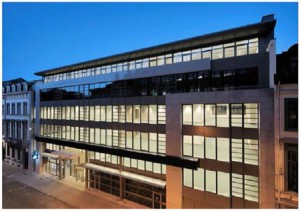 On 23 October 2018, the first workshop organised by the BioMonitor project took place in Brussels (Belgium). The report D7.2 “First Stakeholder Workshop” with the conclusions of the workshop is now available on the project website.
On 23 October 2018, the first workshop organised by the BioMonitor project took place in Brussels (Belgium). The report D7.2 “First Stakeholder Workshop” with the conclusions of the workshop is now available on the project website.
During the workshop, the BioMonitor team oriented the participants about the project and its goals. They later discussed on the indicators stakeholders wish to see, and the training they need in order to make the most out of the BioMonitor system.
Participants included people from industries, governmental and research organisations who are involved in the collection of statistical data. Policy makers and business representatives who need such data to monitor the bioeconomy were also present in the workshop.
The event was organised by nova-Institute, a partner in the BioMonitor project; they are coordinating a work package regarding the “Methodology development and creation of the BioMonitor Data Platform”. The main results of the workshop have been summarised in D7.2 “First Stakeholder Workshop”, which has been released in January 2019 (click here to download the full report).
Below is an interview we did with Stephan Piotrowski from nova-Institute. During the workshop, he gave a presentation on indicators for the monitoring of the bioeconomy.
Q: At this first workshop the BioMonitor team has collected valuable input from key stakeholders. How will the project take on board the outcome of the discussion held?
SP: Our project is currently busy in developing the framework for measuring the bioeconomy to establish which indicators should be covered in BioMonitor. The workshop participants stated which indicators are important to them. Based on the outcome of the discussion a new set of indicators will be developed. Moreover, the workshop gave us an opportunity to identify what the training needs of the different categories of stakeholders are as the training element is an important pillar of the project.
Q: Did the workshop participants have any expectation with regards to BioMonitor?
SP: One remark was made very clearly at the workshop: it is important that the monitoring system that will be developed by BioMonitor is meaningful and useful. In other words, it must be actionable and must be able to address the needs of the policy makers, enterprises and NGO. Operators expect from our project an outcome they can work on immediately and nothing too “academic” and far removed from their real demands.
Q: From the conversation you had with the stakeholders, what will be the main benefit brought by BioMonitor?
SP: It is necessary to structure the massive bundle of data available to understand what drives the bioeconomy and how policymaking can speed up its development. Nowadays there are all sorts of official statistics and data collected from different industry associations on different purposes. Their providers work independently and use different methodologies to calculate monitoring data which, as a result, are often contradicting. This usually leaves users of statistical data confused. Take as an example fundamental indicators like turnover or employment in the bioeconomy: several analyses have been conducted which lead to different conclusions, and nobody knows which data set is the most accurate. This is a problem, particularly for policy makers: those who operate at a top level might not have the necessary scientific background to choose the best data sources for their decision making and do not dig deep and check every detail that goes on in the scientific methodology behind data sets. However policy makers need guidance and clearly understandable results i.e. indicators in order to implement the most effective strategical objectives for the EU in the future.
BioMonitor will be tackling these issues by offering them the monitoring systems being developed as of the moment.
Q: According to some participants in the workshop, “BioMonitor should try to base everything on available data or use “innovative” ways to collect new data, because collection of new official data is always difficult”. How will BioMonitor implement this recommendation?
SP: The collection of new data on bio-based products is one element we are developing in BioMonitor. On one hand, there is a need to expand statistical classification to include new biobased products. Realistically speaking, such classification cannot be expected to cover all products partly because there are tons of data on products that have never been gathered. Filling in this gap would then be a burden for industry and statistical offices, who are expected to collect such data.
BioMonitor will come up with solid methodologies that calculate new statistical data based on existing ones. We start by looking back at an established methodology that has been developed by JRC and NOVA, which is based on expert estimates. In BioMonitor we will further develop and improve this methodology so that we increase accuracy in measuring the bioeconomy while keeping the workload linked to data collection acceptable for providers.
Click here to download the report D7.2 “First Stakeholder Workshop”
Source
Biomonitor.eu, press release, 2019-01-28.
Supplier
Share
Renewable Carbon News – Daily Newsletter
Subscribe to our daily email newsletter – the world's leading newsletter on renewable materials and chemicals










